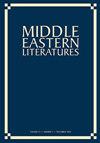“Milli etmek” [Making national]: masculinity, queerness and disability in Murat Uyurkulak’s Merhume
IF 0.2
4区 文学
0 LITERATURE
引用次数: 1
Abstract
ABSTRACT Murat Uyurkulak’s 2016 novel, Merhume, centers stories of queer, disabled and otherwise marginalized characters and embeds them within a real and imagined political history of Turkey. Through the narratives of Alper Kenan, a crime novelist with dwarfism, and Evren Tunga, a butch lesbian literary critic, Uyurkulak lays bare how national and familial belonging is predicated upon ableist, heterosexist and masculinist ideals of the Turkish nation state. In this article, I analyze how these characters’ lives are shaped by historical narratives of violence and masculinity, and argue that the ideals of masculinity and Turkish nationalism become inherited generational traumas that these disabled and queer characters must negotiate in order to survive. Drawing on scholars of queer and disability studies, I further argue how Uyurkulak himself replicates some of that sexist and ableist violence within the narrative and through his language, and dis-ables his characters by calling into question their narrative agency.“Milli etmek”[制造民族]:穆拉特·乌尔库拉克的《默休姆》中的男子气概、酷儿与残疾
缪拉特·乌尔库拉克(Murat Uyurkulak) 2016年出版的小说《默休姆》(Merhume)以酷儿、残疾人和其他边缘化人物的故事为中心,将他们嵌入土耳其真实和想象的政治历史中。通过患有侏儒症的犯罪小说家阿尔珀·凯南(Alper Kenan)和女同性恋文学评论家埃夫伦·通加(Evren Tunga)的叙述,乌尔库拉克揭示了民族和家庭归属是如何建立在土耳其民族国家的残疾主义、异性恋主义和男性主义理想之上的。在这篇文章中,我分析了这些人物的生活是如何被暴力和男子气概的历史叙述所塑造的,并认为男子气概和土耳其民族主义的理想成为了这些残疾人和酷儿角色为了生存而必须谈判的世代创伤。借助酷儿和残疾研究学者的研究,我进一步论证了乌尔库拉克自己是如何在叙事和他的语言中复制了一些性别歧视和残疾主义暴力,并通过质疑他的叙事代理来削弱他的角色。
本文章由计算机程序翻译,如有差异,请以英文原文为准。
求助全文
约1分钟内获得全文
求助全文

 求助内容:
求助内容: 应助结果提醒方式:
应助结果提醒方式:


